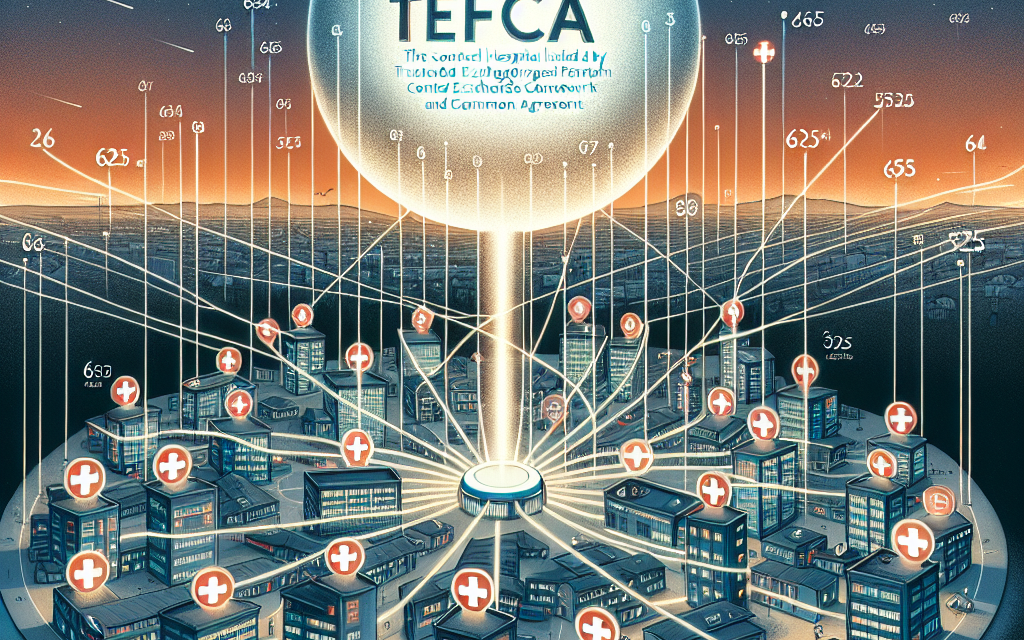Epic Nexus Links 625 Hospitals to TEFCA
The healthcare landscape is undergoing a significant transformation, driven by the need for improved interoperability and data sharing among healthcare providers. One of the most notable advancements in this area is the Epic Nexus initiative, which has successfully linked 625 hospitals to the Trusted Exchange Framework and Common Agreement (TEFCA). This article delves into the implications of this development, exploring its impact on patient care, data exchange, and the future of healthcare technology.
Understanding TEFCA: A Framework for Interoperability
The Trusted Exchange Framework and Common Agreement (TEFCA) is a pivotal initiative aimed at enhancing interoperability across the healthcare system in the United States. Established by the Office of the National Coordinator for Health Information Technology (ONC), TEFCA provides a standardized framework for health information exchange (HIE) among various stakeholders, including healthcare providers, payers, and patients.
TEFCA is designed to facilitate seamless data sharing while ensuring that patient privacy and security are maintained. The framework consists of two main components:
- Trusted Exchange Framework: This outlines the principles and policies that govern the exchange of health information.
- Common Agreement: This is a legal agreement that establishes the terms and conditions under which data can be shared among participants.
TEFCA aims to create a nationwide network of health information exchanges, enabling providers to access patient data regardless of where the care was delivered. This is particularly important in emergency situations where timely access to medical history can be life-saving.
The Role of Epic Nexus in Connecting Hospitals
Epic Systems Corporation, a leading provider of electronic health record (EHR) software, has taken significant steps to enhance interoperability through its Epic Nexus platform. By linking 625 hospitals to TEFCA, Epic Nexus is playing a crucial role in bridging the gap between disparate health information systems.
Epic Nexus facilitates data exchange by providing a centralized platform where healthcare providers can access and share patient information securely. This integration allows for:
- Real-time access to patient data: Providers can view a patient’s complete medical history, including medications, allergies, and lab results, regardless of where the patient has received care.
- Improved care coordination: With access to comprehensive patient information, healthcare teams can collaborate more effectively, leading to better patient outcomes.
- Enhanced patient engagement: Patients can access their health information through patient portals, empowering them to take an active role in their care.
By connecting hospitals to TEFCA, Epic Nexus is not only improving interoperability but also fostering a culture of collaboration among healthcare providers. This is essential for delivering high-quality care in an increasingly complex healthcare environment.
Impact on Patient Care and Outcomes
The integration of Epic Nexus with TEFCA has profound implications for patient care and outcomes. By enabling seamless data exchange, healthcare providers can make more informed decisions, ultimately leading to improved patient safety and quality of care.
One of the most significant benefits of this integration is the reduction of medical errors. According to a study published in the Journal of Patient Safety, nearly 400,000 patients die each year in the United States due to preventable medical errors. Access to comprehensive patient data can help mitigate these risks by providing clinicians with critical information at the point of care.
Additionally, the ability to share data across different healthcare settings enhances care coordination, particularly for patients with chronic conditions who often see multiple specialists. For example:
- A patient with diabetes may need to consult an endocrinologist, a dietitian, and a primary care physician. With Epic Nexus, all providers can access the same information, ensuring that everyone is on the same page regarding the patient’s treatment plan.
- In emergency situations, first responders can access a patient’s medical history, allergies, and medications, allowing them to make informed decisions quickly.
Furthermore, the integration of Epic Nexus with TEFCA supports population health management initiatives. By aggregating data from multiple sources, healthcare organizations can identify trends and patterns that inform public health strategies. For instance, during the COVID-19 pandemic, access to real-time data on infection rates and vaccination status was crucial for effective response efforts.
Challenges and Considerations in Implementation
While the integration of Epic Nexus with TEFCA presents numerous benefits, it is not without challenges. Healthcare organizations must navigate various obstacles to ensure successful implementation and adoption of this interoperability framework.
One of the primary challenges is the variability in EHR systems used by different healthcare providers. Although Epic is a dominant player in the EHR market, many organizations use other systems that may not be fully compatible with Epic Nexus. This can create barriers to data exchange and limit the effectiveness of TEFCA.
Additionally, concerns regarding data privacy and security remain paramount. Healthcare organizations must ensure that patient information is protected during transmission and storage. This requires robust cybersecurity measures and compliance with regulations such as the Health Insurance Portability and Accountability Act (HIPAA).
Moreover, there is a need for ongoing education and training for healthcare providers to effectively utilize the Epic Nexus platform. Many clinicians may be unfamiliar with the functionalities of the system, which can hinder adoption and limit the potential benefits of interoperability.
Finally, financial considerations play a significant role in the implementation of interoperability initiatives. Healthcare organizations must invest in technology infrastructure, staff training, and ongoing maintenance to ensure the success of Epic Nexus and TEFCA. This can be particularly challenging for smaller organizations with limited resources.
The Future of Interoperability in Healthcare
The successful integration of Epic Nexus with TEFCA marks a significant milestone in the journey toward interoperability in healthcare. As more hospitals and healthcare providers join this initiative, the potential for improved patient care and outcomes will continue to grow.
Looking ahead, several trends are likely to shape the future of interoperability:
- Increased adoption of FHIR standards: The Fast Healthcare Interoperability Resources (FHIR) standard is gaining traction as a means of facilitating data exchange. As more organizations adopt FHIR, interoperability will become more seamless.
- Expansion of patient engagement tools: As patients become more involved in their healthcare, the demand for tools that enable them to access and share their health information will increase. Epic Nexus is well-positioned to support this trend.
- Focus on social determinants of health: Understanding the social factors that impact health outcomes is becoming increasingly important. Interoperability initiatives will need to incorporate data related to social determinants to provide a holistic view of patient health.
In conclusion, the integration of Epic Nexus with TEFCA represents a significant advancement in the quest for interoperability in healthcare. By linking 625 hospitals and facilitating seamless data exchange, this initiative has the potential to transform patient care, improve outcomes, and foster collaboration among healthcare providers. While challenges remain, the future of interoperability looks promising, with ongoing innovations and a commitment to enhancing the healthcare experience for all stakeholders.
Conclusion
The Epic Nexus initiative linking 625 hospitals to TEFCA is a landmark achievement in the healthcare industry. It underscores the importance of interoperability in improving patient care and outcomes while addressing the challenges that come with implementing such a comprehensive framework. As healthcare continues to evolve, the lessons learned from this initiative will be invaluable in shaping the future of health information exchange.
By fostering collaboration among healthcare providers, enhancing patient engagement, and leveraging data for better decision-making, Epic Nexus and TEFCA are paving the way for a more connected and efficient healthcare system. The journey toward interoperability is ongoing, but with initiatives like Epic Nexus leading the charge, the future of healthcare looks brighter than ever.





